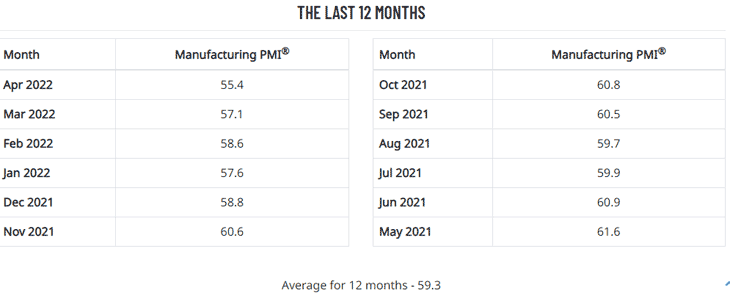The US Purchasing Managers Index (PMI) for April released Monday by the Institute for Supply Management (ISM) was comfortably above the key 50 level that separates US manufacturing expansion from contraction, but showed perhaps some signs of a slowing economy.
Supply Chain Digest Says...
|
 |
| Seventeen of the 18 manufacturing industries ISM tracks reported growth in April, with only Petroleum & Coal Products seeing a decline. |
 |
What do you say? |
| Click here to send us your comments |
|
 |
| Click here to see reader feedback |
|
The April PMI came in at a solid score of 55.4. It also indicated expansion in the overall economy for the 23rd month in a row, since the last contractions in April and May of 2020.
However, the April score was down 1.7 percentage points from the March reading of 57.1. It was also the lowest level seen in the index since July of 2020. Both of those data points could be signaling a slowdown in the face of rampant inflation, the Ukraine war effect, a now sinking stock market, and other pressures. (See chart of the PMI scores for the last 12 months below - the average score over that period was a strong 59.3.)
Most other measures in the ISM report were also headed in the wrong direction, though modestly. For example, the important New Orders Index came in at 53.5, down just 0.3 percentage point compared to March. Similarly, The Backlog of Orders Index registered 56, falling a steeper 4 percentage points lower than the March level of 60.
The Inventories Index registered 51.6 percent, 3.9 percentage points lower than in March, meaning companies are reducing inventoy levels. In fact, the US Commerce Department last week cited lower business inventories as a key factor in the surprsing fall of Q1 US real GDP at annualized rate of 1.4 percent.
The Production Index reading of 53.6 was a modest 0.9-percentage point decrease compared to March’s figure of 54.5
Even the Prices Index, which tracks the cost of materials and components from suppliers, was down 2.5 percentage points, to a score of 84.6. However, it still means 84.6% of respondents indicated they were seeing rising costs from suppliers.

Source: ISM
(See More Below)
|
CATEGORY SPONSOR: SOFTEON |
|
|
| |
|
|
Seventeen of the 18 manufacturing industries ISM tracks reported growth in April, with only Petroleum & Coal Products seeing a decline.
As always, there were some interestng comments from PMI survey respondents. For example, one chemical industry manager said this: “Tier-2 supplier shutdowns in Shanghai are causing a ripple effect for our suppliers in other parts of China. Long delays at ports, including in the U.S., are still providing supply challenges. Inflation is out of control. Fuel costs, and therefore freight costs, are leading the upward cycle. At some point, the economy must give way; it will be tough to have real growth with such pressure on costs. Despite the issues and poor outlook, business remains brisk.”
Added a manager in a food, beverage & tobacco products company: "Supply chain is still constrained, and prices continue to rise. We are focusing on ways to stay profitable while continuing to fill customer orders. Relationship management and strong negotiation skills are extremely important right now.”
Finally, a plastics industry manager had this to say: "Business is still very robust. Material price increases continue to be passed on (to customers) based on costs of raw materials, logistics and labor to produce products.”
Any reaction to this Apil PMI? Let us know your thoughts at the Feedback section below.
|